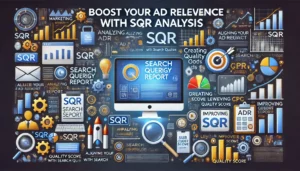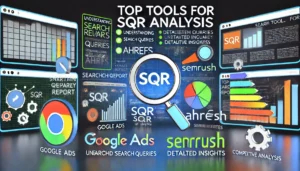Unlocking the Hidden Potential of Your Search Query Report: A Step-by-Step Guide for PPC Marketers

For PPC marketers, the Search Query Report (SQR) is a treasure trove of valuable information. It goes beyond just showing what people are searching for; it reveals how your ads are performing and where you can make improvements. This guide will walk you through the steps to unlock the hidden potential of your SQR, helping you make data-driven decisions that can boost your PPC campaigns.
Key Takeaways
- The Search Query Report (SQR) provides insights into the actual search terms people use, helping you refine your PPC campaigns.
- Using SQR data, you can identify high-performing keywords and discover new long-tail keywords to expand your keyword list.
- SQR insights can help improve ad relevance and boost your Quality Score by aligning ad copy and landing pages with search queries.
- Regularly updating your negative keyword list based on SQR data helps avoid irrelevant clicks and save budget.
- Advanced techniques and tools can automate SQR analysis, making it easier to uncover valuable insights and optimise your campaigns.
Understanding the Search Query Report
What is an SQR?
At its core, the Search Query Report (SQR) provides a detailed breakdown of the actual search queries that triggered your ads. Unlike keywords, which you proactively select, search terms are the real-world phrases that users type into search engines. This report bridges the gap between what you intended to target and what users are actually searching for.
Why SQR Matters for PPC Campaigns
From the perspective of a seasoned marketer, the SQR is akin to peering behind the curtain. It reveals the raw, unfiltered queries that users type into search engines, leading them to your ads. Here’s why it matters:
- Transparency: The SQR allows advertisers to see the exact queries that led to ad impressions.
- Optimisation: By understanding these queries, you can refine your keyword strategy and improve ad relevance.
- Cost Efficiency: Identifying irrelevant queries helps in adding negative keywords, saving on ad spend.
Key Metrics to Focus On
When analysing your SQR, focus on these key metrics:
- Click-Through Rate (CTR): Indicates how often people who see your ad end up clicking it.
- Conversion Rate (CVR): Shows the percentage of clicks that result in a desired action, like a purchase.
- Cost Per Click (CPC): The average amount you pay for each click on your ad.
- Search Term Impressions: The number of times your ad was shown for a particular search term.
The SQR is your compass in the vast sea of search queries, providing a treasure trove of insights that can shape your campaign strategy.
Leveraging SQR for Keyword Research
Identifying High-Performing Keywords
To get the most out of your PPC campaigns, start by identifying high-performing keywords from your Search Query Report (SQR). Focus on keywords that drive the most conversions and have a high click-through rate (CTR). These keywords are your golden tickets. They show what your audience is actively searching for and engaging with. By prioritising these, you can ensure your ads are seen by the right people, increasing the chances of conversions.
Finding Long-Tail Keywords
Long-tail keywords are often less competitive and more specific, making them valuable for targeted campaigns. Use your SQR to find these gems. Look for search queries that are longer and more detailed. These often indicate a user who is further along in the buying process and ready to convert. By incorporating long-tail keywords into your strategy, you can capture this ready-to-buy audience more effectively.
Using SQR Data to Expand Keyword Lists
Your SQR is a treasure trove of data that can help you expand your keyword lists. Analyse the search terms to find new keywords that you haven’t targeted yet. This can help you broaden your reach and attract a wider audience. Make sure to verify the search volume and competition for these new keywords to ensure they are worth targeting. By continuously updating and expanding your keyword lists, you can keep your PPC campaigns fresh and effective.
Regularly reviewing your SQR can uncover new opportunities and help you stay ahead of the competition. Don’t let this valuable data go to waste.
Enhancing Ad Relevance and Quality Score
Improving Ad Copy Based on SQR Insights
To boost your ad relevance, start by analysing your Search Query Report (SQR). This report reveals the exact terms users searched for before clicking on your ad. By aligning your ad copy with these search queries, you can create more targeted and compelling ads. High ad relevance can significantly improve your Quality Score, which in turn lowers your cost-per-click (CPC) and enhances your ad position.
Aligning Landing Pages with Search Queries
Your landing pages should closely match the intent behind the search queries. If users search for “eco-friendly sneakers” and land on a page showcasing sustainable footwear, they are more likely to convert. This alignment not only improves user experience but also boosts your Quality Score. Regularly update your landing pages based on insights from your SQR to maintain high relevance.
Boosting Quality Score through Relevance
Google rewards ads that are highly relevant to user searches. By continuously refining your keywords, ad copy, and landing pages based on SQR data, you can achieve a higher Quality Score. A better Quality Score means your ads are more likely to be shown in top positions, and you’ll pay less per click. For Google ads PPC campaigns, this is crucial for maximising ROI and staying competitive.
Identifying and Managing Negative Keywords
Negative keywords are essential for preventing your ads from showing up for irrelevant searches. This helps in reducing wasted ad spend and improving overall campaign efficiency.
Spotting Irrelevant Search Queries
To identify negative keywords, start by analysing your search query report. Look for search terms that are not relevant to your business. For example, if you sell premium smartphones, you don’t want your ad to appear for “cheap flip phones.” Adding “cheap” as a negative keyword will prevent this from happening.
Adding Negative Keywords to Campaigns
Once you’ve identified irrelevant search queries, add them to your negative keyword list. This ensures that your ads won’t show when you don’t want them to. Regularly updating your negative keyword list based on the search term report and performance data is crucial.
Regularly Updating Your Negative Keyword List
Make it a habit to update your negative keyword list regularly. This will help you stay on top of any new irrelevant search terms that may come up. By doing this, you can improve your ad targeting and reduce wasted ad spend.
Pro Tip: Use shared negative keyword lists to streamline your PPC management across multiple campaigns. This feature is especially useful for large accounts or when working with a London PPC agency.
Uncovering Audience Insights from SQR
Understanding User Intent
To truly excel in PPC marketing, you need to grasp the intent behind user searches. The Search Query Report (SQR) is a goldmine for this. By analysing the terms people use, you can understand what they are really looking for. This helps you tailor your ads to meet their needs better. Understanding user intent can significantly improve your ad performance.
Segmenting Audiences Based on Search Behaviour
Different users have different search behaviours. By examining your SQR, you can identify patterns and segment your audience accordingly. For instance, some users might be looking for detailed information, while others are ready to make a purchase. Segmenting your audience allows you to create more targeted and effective ad campaigns.
Tailoring Ads to Different Audience Segments
Once you’ve segmented your audience, the next step is to tailor your ads to these segments. Use the insights from your SQR to craft ad copy that speaks directly to each group. This not only improves ad relevance but also boosts your Quality Score. Tailored ads are more likely to resonate with your audience, leading to higher engagement and conversion rates.
Regularly reviewing your SQR as part of your PPC audit can uncover hidden opportunities and help you stay ahead of the competition.
Advanced Techniques for SQR Analysis
Using Pivot Tables for Deep Analysis
Pivot tables are a powerful tool for dissecting your Search Query Report (SQR). They allow you to organise and summarise large datasets, making it easier to spot trends and patterns. By using pivot tables, you can quickly identify which search queries are driving the most conversions and which ones are costing you money. This helps you make informed decisions about where to allocate your budget.
Automating SQR Analysis with Scripts
Automation can save you a lot of time and effort. Scripts can be used to automatically pull data from your SQR and generate reports. This way, you can focus on analysing the data rather than collecting it. Automated scripts can also help you identify negative keywords and add them to your campaigns, ensuring that your ads are only shown to relevant audiences.
Integrating SQR Data with Other Tools
Integrating your SQR data with other tools can provide a more comprehensive view of your PPC performance. For example, you can combine SQR data with Google Analytics to see how search queries are affecting your website traffic and conversions. This holistic approach allows you to make more informed decisions and optimise your campaigns more effectively.
Advanced techniques like these can significantly enhance your ability to analyse and act on SQR data, leading to better campaign performance and higher ROI.
Tools and Automation for SQR Management
Top Tools for SQR Analysis
To get the most out of your Search Query Report (SQR), you need the right tools. Top tools for SQR analysis include Google Ads, SEMrush, and Ahrefs. These platforms offer comprehensive data that can help you understand your search queries better. For instance, Google Ads provides detailed insights into your search terms, while SEMrush and Ahrefs offer competitive analysis features that can give you an edge.
Automating Routine SQR Tasks
Automation can save you a lot of time and effort. Tools like Google Ads Scripts and automated marketing software can help you automate routine tasks such as adding negative keywords and generating reports. This allows you to focus on more strategic aspects of your campaigns. Imagine not having to manually sift through data; instead, you can set up scripts to do it for you.
Best Practices for Tool Integration
Integrating various tools can amplify your SQR management efforts. For example, combining Google Ads with a social media reporting tool can provide a more holistic view of your audience. This integration can help you tailor your ads more effectively. Always ensure that the tools you choose are compatible and can share data seamlessly.
Leveraging the right tools and automation can significantly enhance your SQR management, making your PPC campaigns more efficient and effective.
Real-World Case Studies
Case Study: E-commerce Success
Imagine an online store struggling with generic keyword targeting. By shifting to a refined strategy crafted by PPC professionals, the company saw a significant increase in qualified traffic. This led to a higher conversion rate and a better return on ad spend (ROAS). The transformation was remarkable.
Case Study: Lead Generation Improvement
A lead generation company was facing challenges in attracting the right audience. By leveraging insights from their Search Query Report (SQR), they identified high-performing keywords and optimised their ad copy. This resulted in a substantial boost in lead quality and quantity.
Case Study: Local Business Growth
A local business wanted to grow its customer base but was limited by its keyword strategy. By using SQR data to find long-tail keywords, they were able to attract more local customers. This approach not only increased foot traffic but also improved their overall sales.
Real-world examples like these highlight the power of a well-analysed SQR. They show how businesses can achieve significant growth by making data-driven decisions.
Conclusion
Unlocking the hidden potential of your Search Query Report (SQR) can truly transform your PPC campaigns. By diving deep into the data, you can uncover valuable keywords, improve ad relevance, and identify negative keywords that save you money. Remember, the SQR is not just a report; it’s a goldmine of insights waiting to be explored. So, take the time to analyse it thoroughly, and you’ll be well on your way to optimising your campaigns and achieving better results. Happy analysing!
Frequently Asked Questions
What is a Search Query Report (SQR)?
A Search Query Report (SQR) shows the actual search terms people used when they clicked on your ads. It’s a tool for understanding what users are looking for.
Why is the SQR important for PPC campaigns?
The SQR helps you see which search terms are driving traffic to your ads. This information is valuable for optimising your keyword strategy and improving ad performance.
How can I identify high-performing keywords using the SQR?
By analysing the SQR, you can find search terms that lead to conversions. These terms can then be added to your keyword list to boost your campaign’s effectiveness.
What are negative keywords and how do I use them?
Negative keywords are terms you don’t want your ads to show for. By adding them to your campaign, you can avoid irrelevant clicks and save money.
How often should I update my negative keyword list?
It’s a good idea to review and update your negative keyword list regularly, at least once a month, to keep your campaigns running efficiently.
Can SQR data help improve my ad copy?
Yes, by understanding the search terms people use, you can tailor your ad copy to better match user intent, making your ads more relevant and effective.
Author
Search Blog
Free PPC Audit
Subscribe to our Newsletter
The Voices of Our Success: Your Words, Our Pride
Don't just take our word for it. With over 100+ five-star reviews, we let our work-and our satisfied clients-speak for us.
"We have been working with PPC Geeks for around 6 months and have found Mark and the team to be very impressive. Having worked with a few companies in this and similar sectors, I rate PPC Geeks as the strongest I have come across. They have taken time to understand our business, our market and competitors and supported us to devise a strategy to generate business. I value the expertise Mark and his team provide and trust them to make the best recommendations for the long-term."
~ Just Go, Alasdair Anderson




